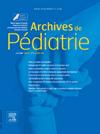Survey on vitamin D supplementation in children in France: Evaluation of real-life practices following the new 2022 French recommendations
IF 1.3
4区 医学
Q3 PEDIATRICS
引用次数: 0
Abstract
Background and objective
In 2022, recommendations for vitamin D supplementation in children were updated in France. The objective of this study was to assess real-life practices of vitamin D supplementation in children following these recommendations.
Methods
A thirty-three-question questionnaire was distributed to members of the scientific societies of paediatrics and general medicine via an online platform.
Results
There were 966 respondents, of whom 87 % were paediatricians and 13 % were general practitioners. About half of the physicians (47 %) were in private practice, 49 % worked in a hospital centre and 6 % worked in a maternal and child health centre. As recommended and regardless of the professional practice, vitamin D supplementation was almost systematically prescribed in all age groups (over 90 % of respondents), in daily doses up to 2 years of age (97 % of all respondents) and then every 3 months in older children (year-round in 38 % and winter/spring only in 40 %). Contrary to the new recommendations, loading doses of 200,000 units of vitamin D were prescribed by 5 % of respondents and non-pharmaceutical forms of vitamin D (e.g. unlicensed food supplements) were prescribed by 10 % of respondents. Although risk factors such as low sun exposure and dark skin were well known by respondents (75 % and 74 % respectively), obesity and veganism were only reported by half the respondents (40 % and 53 % respectively). Two-thirds (61 %) of respondents reported assessing calcium intakes when following children; however, only 10 % of them use specific questionnaires or calcium equivalence tables. Finally, the calcium content of foods and its bioavailability appeared to be poorly understood by health professionals.
Conclusion
This survey shows that the practice of paediatricians and general practitioners are in accordance with the new recommendations for vitamin D supplementation in very young children. The identification by this survey of knowledge gaps will allow targeted information campaigns.
法国儿童维生素 D 补充调查:根据 2022 年法国新建议对现实生活中的做法进行评估。
背景和目的:2022 年,法国更新了儿童补充维生素 D 的建议。本研究旨在评估根据这些建议为儿童补充维生素D的实际做法:方法:通过在线平台向儿科和全科医学科学协会的成员发放了一份包含 33 个问题的调查问卷:共有 966 名受访者,其中 87% 为儿科医生,13% 为全科医生。大约一半的医生(47%)是私人医生,49%在医院中心工作,6%在妇幼保健中心工作。根据建议,无论专业实践如何,几乎所有年龄组(超过 90% 的受访者)都系统地开具了维生素 D 补充剂处方,2 岁以下儿童每天服用一次(占所有受访者的 97%),年龄较大的儿童每 3 个月服用一次(38% 的受访者全年服用,40% 的受访者只在冬春季服用)。与新建议相反,5% 的受访者开出了 20 万单位维生素 D 的负荷剂量处方,10% 的受访者开出了非药物形式的维生素 D 处方(如无证食品补充剂)。尽管受访者对日晒少和皮肤黝黑等风险因素非常了解(分别为 75% 和 74%),但只有半数受访者(分别为 40% 和 53%)报告了肥胖和素食情况。三分之二(61%)的受访者表示在跟踪儿童时会评估钙摄入量;然而,只有 10% 的受访者使用特定的调查问卷或钙当量表。最后,医疗专业人员似乎对食物中的钙含量及其生物利用率知之甚少:这项调查表明,儿科医生和全科医生的做法符合为幼儿补充维生素 D 的新建议。通过此次调查发现的知识差距将有助于开展有针对性的宣传活动。
本文章由计算机程序翻译,如有差异,请以英文原文为准。
求助全文
约1分钟内获得全文
求助全文
来源期刊

Archives De Pediatrie
医学-小儿科
CiteScore
2.80
自引率
5.60%
发文量
106
审稿时长
24.1 weeks
期刊介绍:
Archives de Pédiatrie publishes in English original Research papers, Review articles, Short communications, Practice guidelines, Editorials and Letters in all fields relevant to pediatrics.
Eight issues of Archives de Pédiatrie are released annually, as well as supplementary and special editions to complete these regular issues.
All manuscripts submitted to the journal are subjected to peer review by international experts, and must:
Be written in excellent English, clear and easy to understand, precise and concise;
Bring new, interesting, valid information - and improve clinical care or guide future research;
Be solely the work of the author(s) stated;
Not have been previously published elsewhere and not be under consideration by another journal;
Be in accordance with the journal''s Guide for Authors'' instructions: manuscripts that fail to comply with these rules may be returned to the authors without being reviewed.
Under no circumstances does the journal guarantee publication before the editorial board makes its final decision.
Archives de Pédiatrie is the official publication of the French Society of Pediatrics.
 求助内容:
求助内容: 应助结果提醒方式:
应助结果提醒方式:


